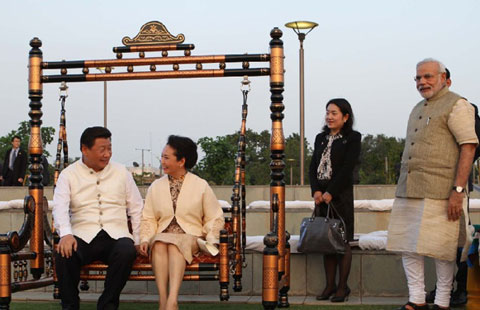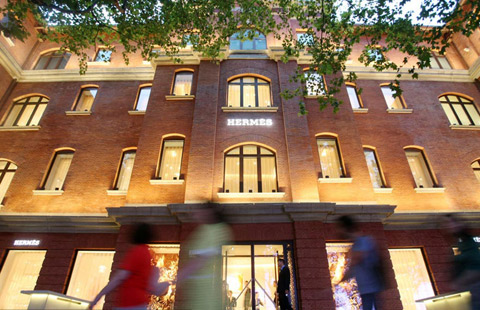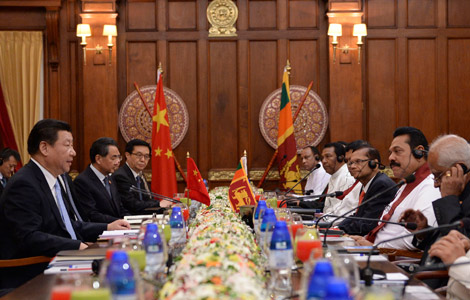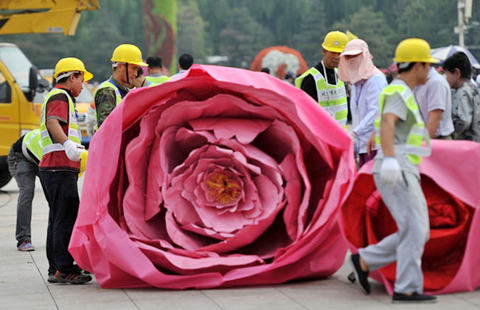Scotland's road to independence referendum
Updated: 2014-09-18 11:17
(Xinhua)
|
||||||||
EDINBURGH - Scotland is to hold a historic referendum on whether it should become an independent country on Thursday. While the independence referendum itself has been a relatively new creation, the Scots' bid for bigger autonomy has traversed a long way since centuries ago.
The Scottish people, or Scots, are an ethnic group native to Scotland. They are believed to have emerged from an amalgamation of the ancient Picts and Gaels. The Kingdom of Scotland emerged as an independent sovereign state in the early Middle Ages.
Scots fought decades of war of independence against their southern neighbor the Kingdom of England in the 13th and 14th centuries.
Between 1296 and 1328, Scots led by William Wallace defended against English aggression after King Edward I of England invaded Scotland in 1296, which was famously depicted in Hollywood blockbuster the Braveheart. In 1314, Scotland defeated the English at Battle of Bannockburn.
From 1603, in what was known as the Union of the Crowns, King James VI of Scotland was declared King of England and Ireland, enabling the countries to share the same monarch in a "personal union."
In the late 17th century, the Kingdom of Scotland suffered a major financial setback after a failed colonization initiative in Panama, known as the Darien Disaster.
In 1707, the independent Scottish kingdom ceased to exist when it formed a political union with the Kingdom of England, with the passage of Treaty of Union and subsequent Acts of Union. The Scottish Parliament was thus dissolved and merged with its English equivalent.
While the newly established Kingdom of Great Britain allowed Scotland to share England's international trade routes and growing influence of the British Empire, major Scottish resistance to the union persisted through 1746.
Reluctant to be governed by Westminster governments, which some Scots believed often overlooked the Scottish priorities, support for devolution and even independence began to grow in Scotland from the mid 19th century.
In 1934, the pro-independence Scottish National Party (SNP), now the ruling party in Scotland, was formed.
In 1979, a referendum was held on Scottish devolution, but failed to gain the mandatory 40 percent of the electorate.
In 1997, a second referendum was held, with an overwhelming majority of voters backing devolution.
In 1999, a devolved legislature, the Scottish Parliament, was reconvened with authority over some limited areas of home affairs, following a referendum in 1997. In 2007, the SNP formed a minority government with support from the Scottish Green Party.
In 2011, after wining a majority in the 129-member Scottish parliament with 69 seats, the SNP was able to form the first majority government in Scotland.
In October 2012, British Prime Minister Cameron and Scottish First Minister Alex Salmond signed the Edinburgh Agreement, allowing Scotland to hold an independence referendum in autumn 2014 on the question of "Should Scotland be an independent country? "
In November 2013, the Scottish government published its independence whitepaper "Scotland's Future", with a plan to create jobs, boost the economy and increase long-term economic security if "Yes" campaign wins the referendum.
The whitepaper argues that an independent Scotland can be a more democratic and prosperous country with a fairer society.
All three major political parties in Britain, including the Conservatives, the Labor Party and the Liberal Democrats have been opposed to the Scottish independence, but promised to offer more devolved powers for Scotland if Scots vote "No."
The polls are scheduled to open at 7 am on Thursday and close at 10 pm Counting of the votes begins at 32 regional centers of Scotland after the end of polls. First results are expected to begin from around 1 am onwards on Friday.
The final overall result of all 32 local totals will be announced by the Chief Counting Officer in Edinburgh at around 6:30 am-7:30 am on Friday morning at the earliest.
About 4.29 million people have registered to vote in the referendum, and both campaigns expect the turnout to be high.
- 'Yes' in Scotland could mean 'maybe' for Chinese companies
- Scotland: An inconvenient possibility
- Scottish FM insists using pound if Scotland votes for independence
- Independent Scotland will be a blow to UK
- British PM makes final appeal against Scotland independence
- Independent Scotland will be a blow to UK

 President Xi and wife play swing in Modi's home state
President Xi and wife play swing in Modi's home state
 China's first Hermes Maison opening in Shanghai
China's first Hermes Maison opening in Shanghai
 9.18 Incident marked in China
9.18 Incident marked in China
 PLA's 'Gold Helmet' air battle contest takes off
PLA's 'Gold Helmet' air battle contest takes off
 Get together in space: experts
Get together in space: experts
 FTA high on agenda of China, Sri Lanka
FTA high on agenda of China, Sri Lanka
 ZTE's ZMAX makes debut
ZTE's ZMAX makes debut
 Tian'anmen Square dresses up for National Day
Tian'anmen Square dresses up for National Day
Most Viewed
Editor's Picks

|

|

|

|

|

|
Today's Top News
Xi, Modi set friendly tone for visit
Chinese naval chief debuts at Seapower forum
Chinese like trade, FDI, not acquisitions: Survey
Multilingual services bills on Brown's desk
Baidu speeds up online commerce
Ma named 'Asia Game Changer of the Year'
FDI dips for 2nd straight month
SF airport launches bilingual website for Chinese tourists
US Weekly

|

|







